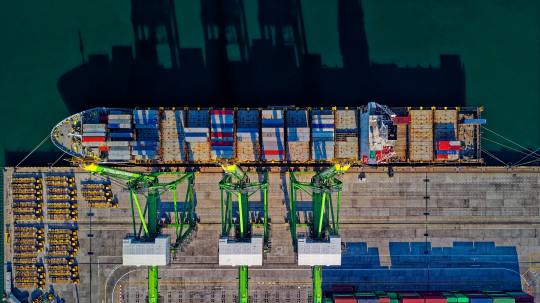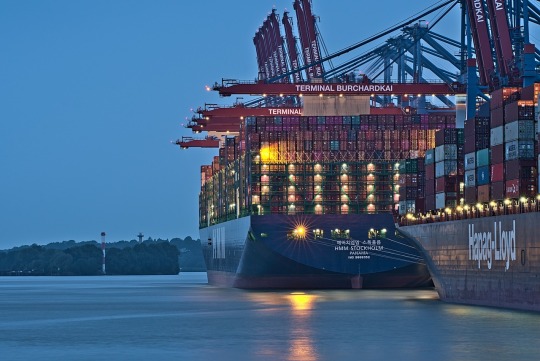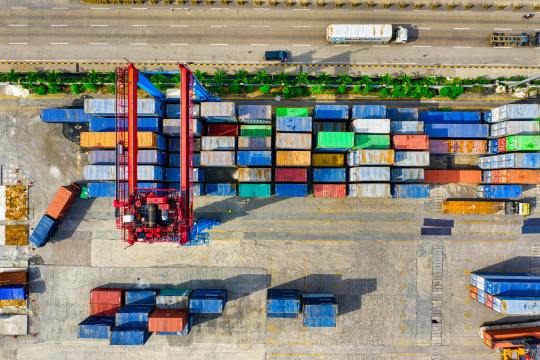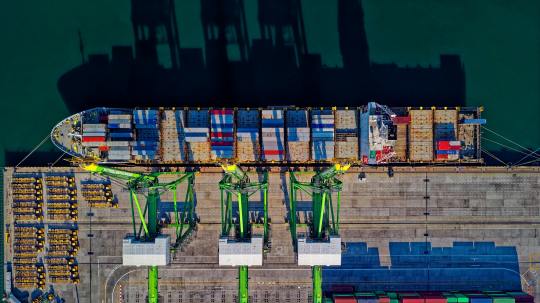Don't wanna be here? Send us removal request.
Text
Transportation Logistics Management: Streamlining Operations for Maximum Efficiency

In the fast-paced world of logistics, transportation logistics management plays a pivotal role in ensuring the smooth movement of goods from one location to another. For companies like Mojro, which specialize in logistics planning and optimization software, understanding and improving transportation logistics management is crucial for delivering value to clients across various industries.
Understanding Transportation Logistics Management
Transportation logistics management refers to the planning, execution, and control of the transportation of goods from the point of origin to the final destination. It encompasses a wide range of activities, including route planning, carrier selection, shipment tracking, and delivery scheduling. Effective transportation logistics management ensures that goods are delivered on time, in good condition, and at the lowest possible cost.
For businesses, transportation logistics management is more than just moving products from point A to point B. It involves optimizing resources, reducing operational costs, and enhancing customer satisfaction. Companies that excel in this area can gain a competitive advantage by providing faster and more reliable services.
The Role of Logistics Planning and Optimization Software
Logistics planning and optimization software, such as that offered by Mojro, is designed to enhance transportation logistics management by automating and optimizing various processes. This software leverages advanced algorithms and data analytics to create efficient transportation plans, taking into account factors such as distance, traffic, fuel costs, and delivery windows.
One of the key benefits of using logistics planning and optimization software is the ability to perform real-time route optimization. By analyzing current traffic conditions, weather forecasts, and other variables, the software can suggest the most efficient routes for delivery vehicles. This not only reduces fuel consumption but also minimizes delivery times, leading to cost savings and improved customer satisfaction.
Additionally, logistics planning and optimization software can help in fleet management, another critical component of transportation logistics management. The software can monitor vehicle performance, schedule maintenance, and track driver behavior, ensuring that the fleet operates at peak efficiency. By reducing downtime and extending the lifespan of vehicles, companies can lower their operational costs and increase profitability.
Addressing Challenges in Transportation Logistics Management
While transportation logistics management offers numerous benefits, it also presents several challenges. One of the primary challenges is dealing with unexpected disruptions, such as traffic jams, road closures, or vehicle breakdowns. These disruptions can lead to delays, increased costs, and dissatisfied customers.
Logistics planning and optimization software can mitigate these challenges by providing real-time updates and contingency plans. For example, if a vehicle encounters a traffic jam, the software can automatically reroute the vehicle to avoid delays. This level of adaptability ensures that goods are delivered on time, even in the face of unforeseen obstacles.
Another challenge in transportation logistics management is managing the complexity of multi-modal transportation. Many companies use a combination of road, rail, air, and sea transportation to move goods across long distances. Coordinating these different modes of transport requires careful planning and execution.
Mojro's logistics planning and optimization software simplifies multi-modal transportation by providing a centralized platform for managing all transportation activities. The software can integrate data from various sources, allowing companies to plan and track shipments across multiple modes of transport seamlessly. This not only improves efficiency but also reduces the risk of errors and delays.
The Future of Transportation Logistics Management
As technology continues to advance, the future of transportation logistics management looks promising. Emerging technologies such as artificial intelligence (AI), machine learning, and the Internet of Things (IoT) are expected to revolutionize the way companies manage their transportation logistics.
For instance, AI-powered logistics planning and optimization software can predict demand patterns and optimize inventory levels, ensuring that goods are always available when needed. IoT devices can provide real-time data on vehicle location, temperature, and other critical parameters, enabling companies to monitor and control their transportation operations more effectively.
Transportation logistics management is a critical component of the supply chain that requires careful planning and execution. By leveraging logistics planning and optimization software, companies like Mojro can streamline their transportation operations, reduce costs, and enhance customer satisfaction. As technology continues to evolve, the future of transportation logistics management promises to bring even greater efficiency and innovation to the logistics industry.
0 notes
Text
Understanding Logistics and Management in Modern Supply Chain

Logistics and management are two fundamental components that drive the efficiency and effectiveness of supply chains in today's fast-paced global economy. These two elements work in tandem to ensure that goods move seamlessly from the point of origin to the final destination, meeting customer demands and maintaining operational efficiency. In the context of logistics planning and optimization software, such as what Mojro offers, understanding the interplay between logistics and management becomes even more critical.
The Role of Logistics in Supply Chains
Logistics involves the planning, implementation, and control of the efficient movement and storage of goods, services, and related information from the point of origin to the point of consumption. It is the backbone of any supply chain, ensuring that products are delivered to the right place, at the right time, and in the right condition. This process includes several key activities:
Transportation Management: This involves selecting the most efficient mode of transportation, managing carriers, and optimizing routes to reduce costs and improve delivery times.
Warehouse Management: Efficient storage and handling of goods in warehouses are crucial to minimizing lead times and ensuring quick order fulfillment.
Inventory Management: Balancing stock levels to meet demand without overstocking or understocking is essential for cost control and customer satisfaction.
Order Fulfillment: Ensuring that customer orders are processed accurately and delivered promptly is a key aspect of logistics management.
The Importance of Management in Logistics
Management in logistics refers to the strategic planning, organization, and oversight of logistics activities to achieve business goals. Effective management ensures that the logistics process is aligned with the overall business strategy and operates within budgetary constraints. Key aspects of logistics management include:
Supply Chain Integration: Integrating all components of the supply chain, from suppliers to customers, ensures smooth operations and improves overall efficiency.
Risk Management: Identifying potential risks in the supply chain, such as disruptions or delays, and implementing strategies to mitigate them is crucial for maintaining service levels.
Performance Monitoring: Regularly monitoring logistics performance using key performance indicators (KPIs) helps identify areas for improvement and ensures continuous optimization.
Sustainability: Implementing eco-friendly practices in logistics, such as reducing carbon emissions and minimizing waste, is becoming increasingly important for businesses.
How Logistics Planning and Optimization Software Enhances Management
Logistics planning and optimization software, like Mojro, plays a pivotal role in enhancing logistics management. These tools leverage advanced algorithms and real-time data to streamline logistics processes, reduce costs, and improve service quality. Here’s how:
Route Optimization: Software can analyze multiple factors, such as traffic, delivery windows, and vehicle capacity, to determine the most efficient routes, reducing fuel consumption and delivery times.
Demand Forecasting: By analyzing historical data and market trends, the software can predict demand, enabling better inventory management and reducing the risk of stockouts or overstocking.
Real-Time Tracking: Real-time visibility into the location of goods allows for better coordination and quicker response to any issues that may arise during transit.
Automated Scheduling: Automating tasks such as order processing, shipment scheduling, and fleet management frees up resources and reduces the likelihood of human error.
Data Analytics: Advanced analytics provide insights into logistics performance, helping businesses identify bottlenecks, optimize processes, and make informed decisions.
In the competitive world of supply chains, effective logistics and management are key to maintaining a competitive edge. By leveraging logistics planning and optimization software, businesses can enhance their logistics operations, reduce costs, and improve customer satisfaction. Mojro’s solutions empower companies to navigate the complexities of modern logistics, ensuring that they remain agile, efficient, and ready to meet the demands of an ever-changing market.
0 notes
Text
Enhancing Logistics Management and Supply Chain with Optimization Software

In today's fast-paced global market, effective logistics management and an optimized supply chain are essential for any business aiming to maintain a competitive edge. The integration of advanced logistics planning and optimization software has become a game-changer, enabling companies to streamline their operations, reduce costs, and improve overall efficiency.
The Role of Logistics Management in the Supply Chain
Logistics management is a critical component of the supply chain, overseeing the movement, storage, and processing of goods from the point of origin to the final destination. It involves various functions such as transportation management, warehousing, inventory control, and order fulfillment. Efficient logistics management ensures that products are delivered to the right place at the right time, meeting customer demands while minimizing operational costs.
In a globalized economy, the complexity of supply chains has increased significantly. Companies are dealing with multiple suppliers, manufacturers, and distributors across different regions, making logistics management more challenging. This is where logistics planning and optimization software like Mojro plays a crucial role.
The Importance of Supply Chain Optimization
Supply chain optimization focuses on enhancing the efficiency of all processes involved in the production and delivery of goods. This includes everything from sourcing raw materials to manufacturing and distribution. By optimizing the supply chain, companies can reduce lead times, minimize costs, and improve service levels.
Mojro’s logistics planning and optimization software offers robust tools for supply chain optimization. It provides real-time visibility into all aspects of the supply chain, allowing businesses to make data-driven decisions. The software helps in identifying bottlenecks, predicting demand, and managing inventory more effectively. With the ability to simulate different scenarios, companies can also anticipate potential disruptions and develop contingency plans to mitigate risks.
How Optimization Software Transforms Logistics Management
Logistics planning and optimization software transforms logistics management by automating routine tasks, optimizing routes, and improving communication across the supply chain. For instance, Mojro’s route optimization feature enables companies to find the most efficient routes for deliveries, reducing fuel consumption and transit times. This not only lowers transportation costs but also enhances customer satisfaction by ensuring timely deliveries.
Additionally, the software’s predictive analytics capabilities help in forecasting demand and managing inventory levels. By accurately predicting when and where demand will occur, companies can ensure that they have the right products available at the right time, reducing the risk of stockouts or overstocking.
Incorporating logistics planning and optimization software into logistics management and the supply chain is no longer a luxury but a necessity in the modern business landscape. Tools like Mojro enable companies to optimize their operations, reduce costs, and deliver superior customer service. As supply chains continue to evolve and become more complex, the role of advanced software solutions will only grow in importance, helping businesses navigate challenges and capitalize on opportunities in an increasingly competitive market.
0 notes
Text
Dairy Software: Enhancing Logistics Planning and Optimization

The dairy industry is a complex network of production, processing, distribution, and retailing. Efficient logistics planning and optimization are crucial to ensure the freshness and quality of dairy products. This is where advanced dairy software comes into play. Mojro's logistics planning and optimization software offers robust solutions tailored to the unique challenges of the dairy industry, ensuring streamlined operations, reduced costs, and enhanced customer satisfaction.
Streamlining Dairy Supply Chain
Dairy products have a short shelf life, making timely delivery essential. Mojro's dairy software helps streamline the supply chain by integrating various processes, from procurement of raw materials to the distribution of finished products. This integration ensures real-time visibility and control over the entire supply chain, enabling dairy businesses to respond quickly to any disruptions or changes in demand.
Route Optimization for Efficient Delivery
One of the critical aspects of dairy logistics is route optimization. Efficient route planning reduces delivery time and ensures that dairy products reach their destination while still fresh. Mojro's route optimization software uses advanced algorithms to determine the most efficient delivery routes, considering factors such as traffic conditions, delivery windows, and vehicle capacity. This not only reduces fuel consumption and operational costs but also enhances the reliability of deliveries.
Real-Time Tracking and Monitoring
Mojro's dairy software provides real-time tracking and monitoring of vehicles and shipments. This feature allows dairy companies to monitor the status of their deliveries and ensure that products are transported under optimal conditions. Real-time tracking also enhances transparency, as customers can receive updates on the status of their orders, leading to improved customer satisfaction and trust.
Inventory Management
Effective inventory management is crucial in the dairy industry to prevent overstocking or stockouts. Mojro's logistics planning software offers sophisticated inventory management tools that provide accurate demand forecasting and inventory tracking. This helps dairy businesses maintain optimal inventory levels, reducing waste and ensuring that products are always available when needed.
Enhancing Cold Chain Management
Maintaining the cold chain is vital for preserving the quality of dairy products. Mojro's software includes features specifically designed for cold chain management. It ensures that products are stored and transported at the correct temperatures, preventing spoilage and extending shelf life. The software also provides alerts for any deviations from the required temperature range, allowing for immediate corrective action.
Data-Driven Decision Making
Data plays a crucial role in optimizing logistics operations. Mojro's dairy software collects and analyzes data from various sources, providing valuable insights into the performance of the supply chain. This data-driven approach enables dairy businesses to identify areas for improvement, optimize resource allocation, and make informed decisions that enhance overall efficiency.
Compliance and Reporting
The dairy industry is subject to stringent regulations regarding food safety and quality. Mojro's logistics software helps ensure compliance with these regulations by providing detailed documentation and reporting tools. The software tracks all stages of the supply chain, from production to delivery, ensuring that all processes meet regulatory standards. This not only helps in maintaining compliance but also enhances the credibility of the dairy business.
Scalability and Customization
Mojro's dairy software is designed to be scalable and customizable, catering to the specific needs of different dairy businesses. Whether a small dairy farm or a large dairy processing company, the software can be tailored to meet unique requirements, ensuring that all logistics operations are optimized for maximum efficiency.
In the competitive dairy industry, efficient logistics planning and optimization are essential for success. Mojro's dairy software offers comprehensive solutions that streamline supply chain operations, optimize delivery routes, enhance inventory management, and ensure compliance with industry regulations. By leveraging advanced technologies and data-driven insights, dairy businesses can achieve greater efficiency, reduce costs, and deliver high-quality products to their customers consistently.
0 notes
Text
FMCG Logistics: Optimizing Efficiency with Advanced Planning and Optimization Software

Fast-Moving Consumer Goods (FMCG) logistics presents unique challenges due to the high volume and quick turnover of products. Efficient logistics planning and optimization software, like Mojro, plays a pivotal role in ensuring the smooth operation of FMCG supply chains. This article explores the significance of advanced logistics solutions in the FMCG sector and how they enhance efficiency, reduce costs, and improve customer satisfaction.
Understanding FMCG Logistics
FMCG logistics involves the management of the movement, storage, and distribution of products that have a short shelf life and are in high demand. Examples include perishable goods like food and beverages, toiletries, and household products. The primary challenges in FMCG logistics include:
High Demand Variability: FMCG products experience fluctuating demand due to seasonality, promotions, and market trends.
Short Shelf Life: Perishable goods require swift and efficient transportation to maintain freshness and quality.
Complex Distribution Networks: FMCG supply chains often involve multiple stakeholders, including manufacturers, distributors, retailers, and consumers.
Regulatory Compliance: Strict regulations regarding food safety and product handling must be adhered to.
The Role of Logistics Planning and Optimization Software
Logistics planning and optimization software, such as Mojro, addresses these challenges by providing advanced tools and technologies that streamline operations. Here are key benefits:
Demand Forecasting: Accurate demand forecasting is crucial for FMCG logistics. By analyzing historical data and market trends, the software predicts future demand, helping businesses plan inventory levels, production schedules, and distribution routes more effectively.
Route Optimization: Efficient route planning minimizes transportation costs and delivery times. Mojro's route optimization capabilities consider factors such as traffic conditions, delivery windows, and vehicle capacities to determine the most efficient routes. This ensures timely deliveries and reduces fuel consumption.
Inventory Management: Maintaining optimal inventory levels is essential to prevent stockouts and overstock situations. Logistics software provides real-time visibility into inventory levels, enabling businesses to manage stock more effectively and reduce wastage.
Real-Time Tracking and Visibility: Real-time tracking of shipments enhances transparency and allows for proactive issue resolution. Businesses can monitor the status of deliveries, track vehicle locations, and receive alerts for any delays or deviations from planned routes.
Regulatory Compliance: Compliance with food safety and handling regulations is critical in FMCG logistics. The software ensures adherence to these regulations by providing documentation and tracking features that verify the proper handling and storage of products.
Cost Reduction: By optimizing routes, reducing fuel consumption, and minimizing inventory holding costs, logistics software significantly reduces operational expenses. This cost efficiency is crucial in the highly competitive FMCG sector.
Case Study: Mojro's Impact on FMCG Logistics
A leading FMCG company implemented Mojro's logistics planning and optimization software to address their logistics challenges. The results were impressive:
Improved Delivery Times: With optimized routes, the company achieved a 20% reduction in delivery times, ensuring fresher products for customers.
Reduced Transportation Costs: By minimizing fuel consumption and maximizing vehicle utilization, transportation costs were reduced by 15%.
Enhanced Inventory Management: Real-time visibility into inventory levels enabled better stock management, reducing stockouts by 10%.
FMCG logistics requires a robust and efficient system to manage the high volume and quick turnover of products. Logistics planning and optimization software like Mojro is essential for addressing the challenges of demand variability, short shelf life, and complex distribution networks. By leveraging advanced technologies for demand forecasting, route optimization, inventory management, real-time tracking, and regulatory compliance, businesses can achieve significant cost savings, improved efficiency, and enhanced customer satisfaction.
In the fast-paced world of FMCG logistics, embracing innovative solutions is the key to staying competitive and meeting the ever-evolving demands of consumers. Mojro's comprehensive logistics software offers the tools needed to streamline operations and ensure the seamless flow of goods from manufacturers to end consumers.
0 notes
Text
Maximizing Efficiency with Advanced Route Optimization Software

How Route Optimization Software Enhances Delivery Efficiency
The implementation of route optimization software in Mojro has significantly improved delivery efficiency by streamlining transportation logistics and reducing overall operational costs. This enhancement has directly impacted delivery speed and customer satisfaction. By utilizing real-time tracking and data analytics, Mojro can now make informed decisions to adjust routes promptly, ensuring timely deliveries and meeting customer expectations.
Moreover, the software has enabled Mojro to achieve substantial cost savings and enhance fuel efficiency. Through optimized routes, the company has reduced mileage, fuel consumption, and vehicle wear and tear, resulting in lower operational expenses and a more sustainable approach to logistics.
Driver productivity and workload balance have also seen notable improvements with the adoption of route optimization software. By providing drivers with optimized routes and real-time updates, Mojro has increased their efficiency and reduced unnecessary idle time, leading to a more balanced workload distribution and improved overall productivity.
Additionally, the software's ability to generate performance metrics has allowed Mojro to assess key delivery KPIs accurately. By analyzing data on delivery times, route efficiency, and driver performance, the company can identify areas for further improvement and implement strategies to enhance overall delivery operations continually. Ultimately, the route optimization software has paved the way for Mojro to elevate its delivery services, ensuring operational excellence and customer satisfaction.
Top Features to Look for in Route Optimization Software
When evaluating route optimization software for Mojro, key features to prioritize include real-time tracking capabilities and customizable route adjustments. Real-time tracking ensures that managers can monitor the progress of deliveries or field operations instantly, allowing for quick decision-making and adjustments as needed. Customizable routes enable businesses to tailor routes based on specific requirements, such as delivery windows, vehicle capacities, or traffic conditions, optimizing efficiency and customer satisfaction.
In addition to real-time tracking and customizable routes, cost savings are a crucial consideration for businesses using route optimization software. Look for features that help minimize fuel consumption, reduce vehicle wear and tear, and optimize driver schedules to achieve significant cost reductions. Integration options are also essential, as seamless integration with existing systems like CRM or ERP platforms streamlines operations and data management.
Furthermore, a user-friendly interface is paramount for ensuring that employees can easily adopt and utilize the software. An intuitive dashboard, clear navigation, and customizable settings contribute to a positive user experience, increasing efficiency and reducing the learning curve for new users. By prioritizing these key features in route optimization software selection, businesses can enhance operational efficiency, reduce costs, and improve overall customer service.
The Future of Route Optimization: Trends to Watch in 2024
Anticipate significant advancements in route optimization technology by 2024 with impactful trends shaping the industry for Mojro. Predictive analytics and real-time tracking will play a pivotal role in enhancing efficiency and accuracy in route planning. By leveraging predictive analytics, Mojro can anticipate traffic patterns, weather conditions, and other variables to optimize routes proactively, reducing delivery times and costs.
The integration of autonomous vehicles and drone delivery systems will revolutionize last-mile logistics, enabling faster and more flexible delivery options. Artificial intelligence and machine learning algorithms will continue to refine route optimization processes, learning from data patterns to suggest the most efficient routes dynamically.
Sustainability and green logistics will become increasingly important in 2024, with companies like Mojro focusing on reducing their carbon footprint through optimized routes that minimize fuel consumption and emissions. Augmented reality and virtual mapping technologies will enhance route visualization and navigation, providing drivers with real-time insights and updates on the go.
0 notes
Text
Dairy Software Singapore: Optimizing Logistics Management

In the bustling dairy industry of Singapore, logistics management, planning, and optimization play a crucial role in ensuring the smooth operation of the supply chain. With the increasing demand for fresh dairy products and the complexities of the supply chain, adopting advanced dairy software solutions is essential for achieving efficiency and maintaining product quality. Mojro's logistics management, planning, and optimization software offer the perfect solution for addressing these challenges and transforming the dairy supply chain in Singapore.
The Importance of Logistics Management in the Dairy Industry
Effective logistics management is vital for the dairy industry due to the perishable nature of dairy products. From milk collection at farms to processing, packaging, and distribution, every step requires precise coordination and timing. Delays or inefficiencies can lead to spoilage, loss of product quality, and financial losses. This is where advanced dairy software comes into play, enabling seamless logistics management and ensuring that products reach consumers in optimal condition.
Streamlining Operations with Dairy Software
Dairy software designed for logistics management integrates various aspects of the supply chain, providing a comprehensive solution for planning and optimization. Key features of such software include:
Route Optimization: Efficient route planning is essential for timely deliveries. Dairy software leverages advanced algorithms to calculate the most efficient delivery routes, reducing travel time and fuel consumption. This not only ensures that products are delivered fresh but also contributes to cost savings and reduced carbon footprint.
Inventory Management: Maintaining optimal inventory levels is crucial in the dairy industry. The software provides real-time visibility into inventory levels, helping businesses manage stock more effectively. This minimizes the risk of overstocking or understocking, ensuring that dairy products are always available when needed.
Demand Forecasting: Accurate demand forecasting is essential for planning production and distribution. Dairy software uses historical data and market trends to predict demand, enabling businesses to plan their operations more effectively. This reduces waste and ensures that the right amount of product is produced and delivered to meet consumer demand.
Fleet Management: Managing a fleet of delivery vehicles is a complex task. Dairy software offers features such as vehicle tracking, maintenance scheduling, and driver management. This ensures that the fleet operates smoothly, minimizing downtime and ensuring timely deliveries.
Compliance and Quality Control: Ensuring compliance with food safety regulations and maintaining product quality is paramount in the dairy industry. The software helps businesses track and manage compliance requirements, conduct quality checks, and maintain detailed records. This enhances transparency and ensures that products meet the highest standards of quality.
Benefits of Implementing Dairy Software in Singapore
Adopting advanced dairy software for logistics management in Singapore offers numerous benefits:
Increased Efficiency: By automating and optimizing various aspects of logistics, dairy software reduces manual effort and minimizes errors. This leads to increased operational efficiency and allows businesses to focus on core activities.
Cost Savings: Efficient route planning, inventory management, and demand forecasting result in significant cost savings. Reduced fuel consumption, minimized waste, and optimized resource utilization contribute to a healthier bottom line.
Enhanced Customer Satisfaction: Timely deliveries and high-quality products are key to customer satisfaction. Dairy software ensures that products reach consumers in the best possible condition, leading to higher customer loyalty and repeat business.
Sustainability: By optimizing logistics and reducing waste, dairy software contributes to sustainability efforts. Lower carbon emissions from efficient route planning and reduced product spoilage align with Singapore's commitment to environmental sustainability.
In the competitive dairy industry of Singapore, leveraging advanced dairy software for logistics management, planning, and optimization is essential for achieving operational excellence. Mojro's comprehensive software solution addresses the unique challenges of the dairy supply chain, from route optimization and inventory management to demand forecasting and compliance. By adopting these technologies, dairy businesses in Singapore can ensure efficiency, cost savings, and enhanced customer satisfaction, ultimately driving growth and success in the market.
0 notes
Text
Optimizing FMCG Logistics in Singapore with Advanced Planning and Optimization Software

In the fast-moving consumer goods (FMCG) sector, efficiency and speed are paramount. Singapore, a major logistics hub in Asia, presents unique challenges and opportunities for FMCG logistics. Leveraging advanced logistics management, planning, and optimization software can significantly enhance the operational efficiency of FMCG supply chains in this dynamic market.
The Importance of FMCG Logistics in Singapore
Singapore's strategic location and well-developed infrastructure make it a critical node in global supply chains. The city-state's FMCG sector is characterized by high consumer demand and rapid turnover rates, necessitating efficient logistics operations. Effective logistics management ensures that products move smoothly from manufacturers to consumers, minimizing delays and reducing costs.
Challenges in FMCG Logistics
High Consumer Expectations: Singaporean consumers expect fast and reliable delivery of FMCG products. Any delays can lead to dissatisfaction and loss of business.
Complex Supply Chains: FMCG supply chains often involve multiple stakeholders, including manufacturers, distributors, retailers, and logistics providers. Coordinating these elements requires sophisticated planning and management.
Regulatory Compliance: Singapore has stringent regulatory requirements for the import and distribution of goods, especially in the FMCG sector. Ensuring compliance while maintaining efficiency is crucial.
Urban Congestion: With its dense urban environment, Singapore faces challenges related to traffic congestion, which can delay deliveries and increase operational costs.
Role of Logistics Management Software
To address these challenges, businesses in the FMCG sector can benefit from robust logistics management software. Such software solutions provide a comprehensive platform for managing, planning, and optimizing logistics operations. Here’s how:
Real-Time Tracking: Modern logistics management software offers real-time tracking of goods, allowing businesses to monitor the movement of products throughout the supply chain. This visibility helps in anticipating delays and taking corrective actions promptly.
Route Optimization: Optimizing delivery routes is essential in Singapore’s congested urban landscape. Advanced route optimization software can analyze traffic patterns, delivery windows, and other factors to determine the most efficient routes, reducing delivery times and fuel costs.
Inventory Management: Effective inventory management is crucial in the FMCG sector to prevent stockouts and overstock situations. Logistics software provides tools for accurate inventory tracking, demand forecasting, and replenishment planning.
Regulatory Compliance: Logistics software can help businesses navigate Singapore’s regulatory landscape by providing features for documentation, compliance tracking, and reporting. This ensures that all regulatory requirements are met without compromising efficiency.
Planning and Optimization Software for FMCG Logistics
Planning and optimization software takes logistics management to the next level by enabling data-driven decision-making and process automation. Key features include:
Predictive Analytics: Using historical data and predictive algorithms, planning software can forecast demand, identify potential disruptions, and suggest proactive measures to mitigate risks.
Automated Scheduling: Automation of scheduling tasks reduces manual effort and minimizes errors. The software can generate optimized schedules for deliveries, pickups, and other logistics activities.
Resource Allocation: Efficient allocation of resources, such as vehicles and personnel, is essential for maintaining high service levels. Optimization software can ensure that resources are used effectively to meet delivery deadlines and customer expectations.
Performance Monitoring: Continuous monitoring and analysis of logistics performance help businesses identify areas for improvement. Key performance indicators (KPIs) such as delivery times, order accuracy, and customer satisfaction can be tracked and optimized.
Case Study: FMCG Logistics in Singapore
A leading FMCG company in Singapore implemented an advanced logistics management and optimization solution to enhance its operations. By leveraging real-time tracking and route optimization features, the company achieved a 20% reduction in delivery times and a 15% decrease in fuel costs. Improved inventory management capabilities led to better stock levels, reducing instances of stockouts by 30%.Efficient FMCG logistics in Singapore Mojro requires a combination of strategic planning, real-time monitoring, and data-driven optimization. By adopting advanced logistics management, planning, and optimization software, businesses can overcome the unique challenges of the Singaporean market and achieve higher operational efficiency. With the right tools, FMCG companies can ensure timely deliveries, regulatory compliance, and ultimately, customer satisfaction.
0 notes
Text
Revolutionizing Logistics with Route Optimization Software in Singapore

In the bustling hub of Southeast Asia, Singapore stands as a beacon of trade and commerce. To maintain its competitive edge, businesses in Singapore must continuously optimize their logistics operations. One of the most effective ways to achieve this is through the implementation of route optimization software. This software, especially tailored for logistics management, planning, and optimization, is essential for companies looking to streamline their operations, reduce costs, and enhance service delivery.
The Role of Route Optimization Software
Route optimization software plays a pivotal role in logistics management. It uses advanced algorithms and real-time data to determine the most efficient routes for deliveries and transportation. This technology not only reduces fuel consumption and vehicle wear and tear but also improves delivery times and customer satisfaction.
For companies in Singapore, where urban density and traffic congestion can present significant challenges, route optimization software is particularly valuable. By dynamically adjusting routes based on current traffic conditions, road closures, and other variables, the software ensures that deliveries are made promptly and efficiently.
Benefits of Route Optimization Software in Singapore
Cost Reduction: Fuel costs are a major expense in logistics. By optimizing routes, companies can significantly reduce fuel consumption. This not only cuts costs but also contributes to environmental sustainability, a growing concern for many businesses.
Improved Efficiency: Route optimization software enables logistics planners to create efficient delivery schedules. This reduces the time drivers spend on the road, allowing for more deliveries to be completed in less time.
Enhanced Customer Service: Timely deliveries are crucial for customer satisfaction. With optimized routes, businesses can provide accurate delivery windows, improving the overall customer experience.
Real-Time Adaptability: Traffic conditions can change rapidly. Route optimization software provides real-time updates and reroutes, ensuring that drivers can avoid delays and maintain their schedules.
Data-Driven Insights: The software collects and analyzes data from each delivery, providing valuable insights into performance and areas for improvement. This data can be used to fine-tune logistics strategies and operations.
Implementing Route Optimization Software
Implementing route optimization software in a logistics operation involves several key steps:
Assessment: Evaluate the current logistics processes to identify areas that need improvement. Understanding the specific challenges faced in Singapore, such as traffic congestion and delivery density, is crucial.
Selection: Choose a route optimization software that suits the specific needs of the business. Consider factors such as scalability, ease of integration with existing systems, and the level of support provided by the software vendor.
Integration: Integrate the software with the company's existing logistics management systems. This ensures seamless data flow and coordination between different aspects of the logistics operation.
Training: Provide training for staff and drivers on how to use the software effectively. Understanding how to interpret and act on the data provided by the software is essential for maximizing its benefits.
Monitoring and Adjustment: Continuously monitor the performance of the software and make adjustments as needed. Regularly review the data and insights provided to ensure that the logistics operation is running as efficiently as possible.
Case Study: Mojro’s Route Optimization Software
Mojro, a leader in logistics planning and optimization software, offers a comprehensive route optimization solution tailored for the unique needs of Singapore’s logistics landscape. Their software integrates seamlessly with existing systems, providing real-time data and insights that drive efficiency and cost savings.
By leveraging Mojro’s route optimization software, businesses in Singapore have reported significant improvements in delivery times and customer satisfaction. The software’s ability to adapt to changing conditions and provide precise, efficient routes has made it an invaluable tool for logistics management.
In a dynamic and competitive market like Singapore, staying ahead in logistics requires innovative solutions. Route optimization software is a critical component for businesses aiming to streamline their operations and enhance service delivery. By reducing costs, improving efficiency, and providing real-time adaptability, this technology is transforming the logistics landscape in Singapore.
For companies looking to optimize their logistics management, planning, and operations, adopting route optimization software from trusted providers like Mojro is a strategic move that promises substantial benefits and a competitive edge in the marketplace.
0 notes
Text
Function of Logistics Management: Key to Efficient Operations

Logistics management is the backbone of any successful business operation, ensuring that goods and services are delivered efficiently and effectively. At Mojro, we understand the critical role that logistics management plays in the supply chain, and our planning and optimization software is designed to streamline these processes. In this article, we will delve into the various functions of logistics management and how our software solutions can enhance these functions for optimal performance.
1. Transportation Management
Transportation is a fundamental component of logistics management. It involves the movement of goods from one location to another, ensuring timely delivery while minimizing costs. Effective transportation management requires careful planning and coordination, which is where Mojro's logistics planning and optimization software excels. By leveraging advanced algorithms and real-time data, our software helps businesses plan optimal routes, reduce fuel consumption, and improve delivery times.
2. Inventory Control
Inventory control is crucial for maintaining the right balance between supply and demand. Too much inventory can lead to increased storage costs, while too little can result in stockouts and lost sales. Mojro's software provides robust inventory management capabilities, allowing businesses to monitor stock levels, forecast demand, and automate replenishment processes. This ensures that inventory levels are optimized, reducing costs and improving customer satisfaction.
3. Warehouse Management
Efficient warehouse management is essential for the smooth operation of the supply chain. It involves the organization and control of warehouse activities, including the receipt, storage, and dispatch of goods. Mojro's logistics software offers comprehensive warehouse management features, such as real-time tracking, automated picking and packing, and space optimization. These capabilities help businesses streamline warehouse operations, reduce errors, and increase productivity.
4. Order Fulfillment
Order fulfillment is the process of receiving, processing, and delivering orders to customers. It is a critical function of logistics management that directly impacts customer satisfaction. Mojro's software facilitates efficient order fulfillment by automating key processes, such as order processing, picking, packing, and shipping. This reduces manual errors, speeds up order processing times, and ensures that customers receive their orders accurately and on time.
5. Demand Forecasting
Accurate demand forecasting is essential for effective logistics management. It involves predicting future demand for products and services, allowing businesses to plan their logistics activities accordingly. Mojro's software leverages advanced analytics and machine learning algorithms to provide accurate demand forecasts. By analyzing historical data, market trends, and other relevant factors, our software helps businesses anticipate demand fluctuations and adjust their logistics strategies accordingly.
6. Supplier Management
Effective supplier management is crucial for maintaining a reliable supply chain. It involves managing relationships with suppliers, negotiating contracts, and ensuring timely delivery of materials. Mojro's logistics software offers supplier management features that help businesses streamline communication, track supplier performance, and manage procurement processes. This ensures that businesses have a reliable supply of materials, reducing the risk of disruptions in the supply chain.
7. Reverse Logistics
Reverse logistics involves the process of returning goods from customers back to the manufacturer or supplier. It is an important function of logistics management, particularly in industries with high return rates, such as e-commerce. Mojro's software supports reverse logistics by providing features for managing returns, processing refunds, and restocking inventory. This helps businesses handle returns efficiently, reducing costs and improving customer satisfaction.
8. Data Analysis and Reporting
Data analysis and reporting are essential for continuous improvement in logistics management. By analyzing key performance indicators (KPIs) and other metrics, businesses can identify areas for improvement and make data-driven decisions. Mojro's software provides powerful analytics and reporting tools that enable businesses to track performance, identify trends, and generate actionable insights. This helps businesses optimize their logistics operations and achieve better results.
The functions of logistics management are diverse and complex, requiring careful planning and coordination. Mojro's logistics planning and optimization software offers comprehensive solutions to streamline these functions, improve efficiency, and reduce costs. By leveraging advanced technologies and real-time data, our software empowers businesses to achieve optimal logistics performance and enhance customer satisfaction.
0 notes
Text
Logistics and Management: Key Strategies for Planning and Optimization Software

In today's fast-paced business environment, efficient logistics management is crucial for companies to stay competitive. Logistics management involves the coordination and movement of resources from origin to destination, ensuring timely and cost-effective delivery. With the advent of advanced planning and optimization software, logistics has evolved into a more precise and manageable process. This article delves into the key strategies for effective logistics management using planning and optimization software.
Understanding Logistics Management
Logistics management encompasses a wide range of activities, including transportation, warehousing, inventory management, and order fulfillment. The primary goal is to ensure that products reach their intended destinations in a timely and cost-efficient manner. Effective logistics management can lead to reduced operational costs, improved customer satisfaction, and increased overall efficiency.
The Role of Planning and Optimization Software
Planning and optimization software plays a pivotal role in modern logistics management. This software helps businesses streamline their operations by automating various processes, predicting potential issues, and providing actionable insights. Here are some ways planning and optimization software enhances logistics management:
Route Optimization: One of the most significant benefits of planning and optimization software is its ability to determine the most efficient routes for transportation. By analyzing factors such as traffic, distance, and delivery windows, the software can suggest optimal routes that save time and reduce fuel consumption.
Inventory Management: Keeping track of inventory levels is essential for preventing stockouts and overstock situations. Planning and optimization software provides real-time visibility into inventory levels, helping businesses maintain optimal stock levels and avoid unnecessary storage costs.
Demand Forecasting: Accurate demand forecasting is critical for effective logistics management. Planning and optimization software uses historical data and advanced algorithms to predict future demand, enabling businesses to prepare for fluctuations and ensure timely replenishment of stock.
Automated Scheduling: Manual scheduling can be time-consuming and prone to errors. Planning and optimization software automates the scheduling process, ensuring that deliveries are planned efficiently and resources are utilized optimally.
Cost Reduction: By optimizing routes, managing inventory efficiently, and automating scheduling, planning and optimization software helps businesses reduce operational costs. This cost-saving advantage is crucial for maintaining profitability in a competitive market.
Implementing Planning and Optimization Software
The implementation of planning and optimization software in logistics management involves several steps:
Assessment of Current Processes: Before implementing the software, it's essential to assess the current logistics processes. Identify areas that need improvement and determine how the software can address these issues.
Choosing the Right Software: There are various planning and optimization software solutions available in the market. It's important to choose a solution that aligns with the specific needs of the business. Consider factors such as scalability, ease of use, and integration capabilities.
Training and Support: Successful implementation requires proper training and support for the staff. Ensure that the team is well-versed in using the software and understands its features and benefits.
Continuous Monitoring and Improvement: Once the software is implemented, continuous monitoring is necessary to ensure it is functioning as expected. Regularly review the performance and make necessary adjustments to optimize the processes further.
The Future of Logistics Management
As technology continues to advance, the future of logistics management looks promising. Emerging technologies such as artificial intelligence, machine learning, and the Internet of Things (IoT) are expected to further revolutionize the industry. These technologies will enable even more precise planning, real-time tracking, and predictive analytics, making logistics management more efficient and effective.
Logistics management is a critical component of any business that deals with the movement of goods. By leveraging planning and optimization software, companies can streamline their logistics processes, reduce costs, and improve customer satisfaction. Implementing the right software solution, combined with continuous monitoring and improvement, can lead to significant enhancements in logistics management.
0 notes
Text
Logistics Planning with Logistics Management and Optimization Software

Effective logistics planning is crucial for the success of any business involved in the supply chain. It involves the systematic coordination of activities to ensure that goods are delivered in the most efficient manner. This article will explore how logistics management and planning software can streamline these processes, focusing on key elements such as optimization and technology integration.
The Importance of Logistics Planning
Logistics planning is the backbone of supply chain management. It involves forecasting demand, managing inventory, and ensuring timely delivery of goods. Proper planning helps in reducing operational costs, improving customer satisfaction, and maintaining a competitive edge. Businesses must integrate advanced logistics management tools to achieve these goals.
Key Components of Logistics Planning
Demand Forecasting
Accurate demand forecasting is essential for effective logistics planning. It helps businesses predict future demand and adjust their inventory levels accordingly.
Inventory Management
Efficient inventory management ensures that the right amount of stock is available at the right time. This reduces storage costs and minimizes the risk of stockouts or overstocking.
Transportation Management
Transportation management involves selecting the most efficient routes and modes of transport. It aims to minimize costs and delivery times while maximizing the use of available resources.
Role of Logistics Management Software
Logistics management software plays a pivotal role in optimizing logistics planning. It offers several features that enhance efficiency and accuracy in logistics operations.
Automated Planning and Scheduling
The software automates the planning and scheduling processes, reducing the time and effort required. It helps in creating optimal delivery schedules based on real-time data.
Route Optimization
Route optimization is a key feature that helps in identifying the most efficient delivery routes. It considers factors such as traffic conditions, delivery windows, and vehicle capacity.
Real-Time Tracking
Real-time tracking enables businesses to monitor the movement of goods throughout the supply chain. It provides visibility and helps in identifying potential issues before they escalate.
Data Analytics
Advanced data analytics capabilities allow businesses to analyze historical data and gain insights into their logistics operations. This helps in making informed decisions and improving overall efficiency.
Benefits of Using Planning and Optimization Software
Cost Reduction
By optimizing routes and schedules, businesses can significantly reduce transportation costs. Efficient inventory management also minimizes storage costs.
Improved Customer Satisfaction
Timely and accurate deliveries lead to higher customer satisfaction. Real-time tracking allows customers to stay informed about their orders, enhancing their overall experience.
Increased Operational Efficiency
Automation and optimization reduce manual intervention, leading to increased operational efficiency. This allows businesses to focus on other critical areas of their operations.
Scalability
Logistics management software is scalable and can adapt to the growing needs of a business. It ensures that logistics operations remain efficient as the business expands.
Implementing Logistics Management Software
Implementing logistics management software requires careful planning and consideration. Businesses should start by identifying their specific needs and choosing a solution that aligns with their goals. It is important to train employees on using the software effectively and continuously monitor its performance to ensure optimal results.
Logistics planning is a critical aspect of supply chain management that can be greatly enhanced with the use of logistics management and optimization software. These tools offer numerous benefits, including cost reduction, improved customer satisfaction, and increased operational efficiency. By leveraging advanced technology, businesses can streamline their logistics operations and maintain a competitive edge in the market.
0 notes
Text
Fleet Management: Enhancing Logistics Planning and Optimization with Mojro

In the ever-evolving landscape of logistics, fleet management stands out as a crucial component that drives efficiency and productivity. Fleet management encompasses the processes, tools, and strategies used to oversee and optimize a company’s vehicle fleet. For businesses in logistics, implementing effective fleet management can significantly reduce costs, improve delivery times, and enhance overall service quality.
Key Components of Fleet Management
Vehicle Tracking and Telematics: Fleet management starts with vehicle tracking, which involves using GPS and telematics to monitor the real-time location and status of vehicles. This technology provides insights into routes taken, driving behavior, and vehicle health, allowing companies to make informed decisions about fleet deployment and maintenance.
Route Optimization: A core aspect of fleet management is route optimization. By analyzing traffic patterns, delivery schedules, and vehicle capacities, route optimization software can determine the most efficient paths for deliveries. This reduces fuel consumption, minimizes wear and tear on vehicles, and ensures timely deliveries.
Maintenance Management: Regular maintenance is vital for keeping a fleet operational. Fleet management systems track maintenance schedules, send reminders for service, and monitor vehicle health metrics. Proactive maintenance prevents breakdowns, extends vehicle lifespan, and reduces downtime.
Fuel Management: Fuel is one of the largest expenses for any fleet. Effective fleet management includes monitoring fuel usage, identifying inefficiencies, and finding ways to reduce consumption. Telematics can track idling times, driving speeds, and fuel purchase history to optimize fuel efficiency.
Compliance and Safety: Fleet management also involves ensuring that vehicles and drivers comply with industry regulations and safety standards. This includes tracking driver qualifications, ensuring adherence to hours-of-service regulations, and maintaining up-to-date vehicle inspections.
Benefits of Fleet Management for Logistics
Cost Savings: By optimizing routes, maintaining vehicles efficiently, and managing fuel consumption, fleet management reduces operational costs. This allows companies to allocate resources more effectively and invest in other areas of their business.
Improved Customer Satisfaction: Timely deliveries are crucial for customer satisfaction. Fleet management ensures that deliveries are made on time by optimizing routes and reducing delays. Enhanced tracking capabilities also provide customers with real-time updates on their shipments.
Increased Productivity: With fleet management, logistics companies can handle more deliveries with fewer resources. Efficient route planning, proactive maintenance, and reduced downtime contribute to higher productivity and more reliable service.
Environmental Impact: Optimizing routes and reducing fuel consumption have a positive impact on the environment. Fleet management helps companies lower their carbon footprint, contributing to sustainability goals and enhancing their corporate social responsibility.
Mojro's logistics planning and optimization software offers comprehensive solutions for fleet management. By integrating advanced technologies like AI and machine learning, Mojro helps businesses streamline their fleet operations. Key features of Mojro's fleet management solutions include:
Advanced Telematics: Real-time tracking and monitoring of vehicles to ensure efficient fleet utilization.
Smart Route Planning: AI-driven algorithms to optimize delivery routes, reducing travel time and fuel consumption.
Predictive Maintenance: Data-driven insights to schedule maintenance before issues arise, preventing costly breakdowns.
Fuel Efficiency Analytics: Tools to monitor and analyze fuel usage, helping businesses implement cost-saving measures.
Compliance Management: Automated tracking of regulatory requirements to ensure fleet compliance and safety.
By leveraging Mojro's fleet management solutions, logistics companies can achieve greater efficiency, reduce costs, and enhance service quality. Fleet management is not just about overseeing vehicles; it's about transforming logistics operations to meet the demands of a fast-paced, competitive market.
Fleet management is integral to the success of logistics operations. With the right tools and strategies, businesses can optimize their fleets, improve service delivery, and achieve significant cost savings. Mojro's innovative software solutions provide the edge needed to stay ahead in the dynamic world of logistics.
0 notes
Text
Understanding the Logistic Scope in Logistics Planning and Optimization Software

In the rapidly evolving world of supply chain management, the term "logistic scope" encompasses a broad range of activities and processes integral to ensuring the efficient movement of goods. For companies like Mojro, specializing in logistics planning and optimization software, understanding and defining this scope is crucial to providing solutions that enhance operational efficiency, reduce costs, and improve service delivery.
Key Elements of Logistic Scope
Transportation Management: Transportation management is a core component of the logistic scope, involving the planning, execution, and optimization of the physical movement of goods. Effective transportation management ensures that goods are delivered to the right place, at the right time, and at the lowest possible cost. Logistics software aids in route optimization, real-time tracking, and freight management, thereby enhancing transportation efficiency.
Inventory Management: Inventory management is essential for maintaining the balance between supply and demand. Within the logistic scope, it includes tracking inventory levels, orders, sales, and deliveries. Advanced logistics planning software provides real-time visibility into inventory, helps prevent stockouts and overstock situations, and supports efficient warehouse operations.
Warehouse Management: Warehouse management encompasses the control and optimization of warehouse operations, including the storage, retrieval, and distribution of goods. Effective warehouse management ensures that goods are stored efficiently and can be easily accessed and moved. Logistics software solutions often include features for layout optimization, inventory tracking, and automated picking and packing processes.
Order Fulfillment: Order fulfillment is the complete process from receiving a customer's order to delivering the goods to the customer. This includes order processing, picking, packing, shipping, and handling returns. Efficient order fulfillment is crucial for customer satisfaction and is a key focus within the logistic scope. Logistics software can streamline these processes, reduce errors, and ensure timely deliveries.
Supply Chain Visibility: Supply chain visibility refers to the ability to track and monitor all activities within the supply chain in real-time. Enhanced visibility allows for better decision-making, faster response to disruptions, and improved collaboration among stakeholders. Logistics planning and optimization software plays a vital role in providing this visibility through advanced analytics and reporting tools.
Demand Forecasting: Accurate demand forecasting is critical for effective logistics planning. It involves predicting future customer demand to ensure that the right amount of product is available at the right time. Logistics software uses historical data, market trends, and machine learning algorithms to provide accurate demand forecasts, helping companies reduce costs and improve service levels.
Benefits of Defining the Logistic Scope
Improved Efficiency: Clearly defining the logistic scope allows companies to identify areas for improvement and implement strategies to enhance efficiency. This can lead to faster order processing, reduced transit times, and better resource utilization.
Cost Reduction: By optimizing various elements within the logistic scope, companies can significantly reduce operational costs. This includes minimizing transportation expenses, reducing inventory carrying costs, and optimizing warehouse space.
Enhanced Customer Satisfaction: A well-defined logistic scope ensures that goods are delivered accurately and on time, leading to higher customer satisfaction. Efficient order fulfillment and real-time tracking contribute to a positive customer experience.
Scalability: A comprehensive understanding of the logistic scope enables companies to scale their operations effectively. As businesses grow, logistics planning and optimization software can adapt to handle increased volumes and more complex supply chains.
The logistic scope in logistics planning and optimization software is vast and multifaceted, covering transportation management, inventory control, warehouse operations, order fulfillment, supply chain visibility, and demand forecasting. For companies like Mojro, specializing in these software solutions, defining and optimizing this scope is essential for enhancing operational efficiency, reducing costs, and improving customer satisfaction. As the logistics landscape continues to evolve, a clear and comprehensive logistic scope will remain a cornerstone of successful supply chain management.
0 notes
Text
Understanding the Components of Logistics for Effective Planning and Optimization

Logistics is the backbone of supply chain management, encompassing various processes that ensure the smooth movement of goods from point A to point B. For companies like Mojro, specializing in logistics planning and optimization software, understanding the core components of logistics is crucial for developing effective solutions. This article explores the essential components of logistics, emphasizing their significance in enhancing efficiency and optimizing operations.
1. Transportation Management
Transportation is a critical component of logistics, involving the movement of goods between locations. Effective transportation management ensures timely delivery, reduces costs, and minimizes disruptions. Key aspects include:
Route Optimization: Using advanced algorithms, transportation routes are optimized to reduce travel time and fuel consumption. Mojro's route optimization software, for example, enables companies to plan the most efficient routes, considering factors like traffic conditions and delivery schedules.
Mode Selection: Choosing the right mode of transportation (road, rail, air, or sea) based on cost, speed, and reliability.
Carrier Management: Selecting and managing carriers to ensure reliable service and competitive rates.
2. Warehousing and Inventory Management
Warehousing involves the storage of goods until they are needed. Efficient warehousing and inventory management are vital for maintaining the balance between supply and demand. Key elements include:
Inventory Control: Ensuring that the right amount of stock is available to meet customer demand without overstocking or stockouts. This involves real-time tracking and automated inventory systems.
Warehouse Layout: Designing the warehouse layout to maximize space utilization and streamline the picking and packing processes.
Technology Integration: Implementing Warehouse Management Systems (WMS) to automate processes and improve accuracy.
3. Order Fulfillment
Order fulfillment is the process of receiving, processing, and delivering orders to customers. Efficient order fulfillment is essential for customer satisfaction and retention. Components include:
Order Processing: Managing orders from receipt to delivery, including picking, packing, and shipping. Automation can significantly speed up this process.
Demand Planning: Forecasting demand to ensure that inventory levels match customer needs. Accurate demand planning reduces the risk of stockouts and overstocking.
Last Mile Delivery: The final step in the delivery process, where goods are delivered to the end customer. This stage is crucial for customer satisfaction and can be optimized using last mile delivery software.
4. Supply Chain Visibility
Supply chain visibility refers to the ability to track and monitor goods as they move through the supply chain. Enhanced visibility improves decision-making and helps in identifying potential issues before they escalate. Components include:
Real-Time Tracking: Using GPS and IoT devices to track the location and status of shipments in real-time.
Data Analytics: Analyzing data from various sources to gain insights into supply chain performance and identify areas for improvement.
Collaborative Platforms: Using software platforms that enable all stakeholders to share information and coordinate activities seamlessly.
5. Risk Management
Risk management in logistics involves identifying, assessing, and mitigating risks that could disrupt the supply chain. Effective risk management ensures business continuity and minimizes losses. Key aspects include:
Risk Assessment: Identifying potential risks, such as natural disasters, political instability, or supplier issues.
Contingency Planning: Developing plans to address potential disruptions, including alternative routes and backup suppliers.
Compliance Management: Ensuring adherence to regulations and standards to avoid legal issues and penalties.
Understanding the components of logistics is fundamental for developing robust logistics planning and optimization solutions. By focusing on transportation management, warehousing and inventory management, order fulfillment, supply chain visibility, and risk management, companies can enhance their operational efficiency and customer satisfaction. Mojro's advanced logistics planning and optimization software leverages these components to deliver comprehensive solutions that meet the evolving needs of the logistics industry. By integrating these elements, businesses can achieve greater efficiency, cost savings, and a competitive edge in the market.
0 notes
Text
DFMCG Logistics: Optimizing Supply Chain Management with Mojro

In the fast-paced world of distribution-focused fast-moving consumer goods (DFMCG), efficient logistics are essential for maintaining a competitive edge. Managing the intricate supply chain processes of DFMCG products, which include everything from perishable goods to high-demand consumer items, requires a sophisticated logistics planning and optimization software. Mojro stands out as a premier solution, streamlining logistics operations and ensuring seamless supply chain management.
The Importance of DFMCG Logistics
DFMCG logistics involves managing the flow of goods from manufacturers to end consumers swiftly and efficiently. This sector is characterized by high turnover rates, tight delivery schedules, and the necessity for real-time inventory management. Without a robust logistics system, businesses can face challenges such as stockouts, overstocking, and delayed deliveries, all of which can significantly impact profitability and customer satisfaction.
Key Challenges in DFMCG Logistics
Demand Variability: The fluctuating nature of consumer demand requires precise demand forecasting and inventory management.
Perishability: For perishable goods, maintaining the cold chain and ensuring timely delivery are crucial to prevent spoilage.
Distribution Network Complexity: Managing a vast distribution network with multiple touchpoints necessitates advanced route planning and optimization.
Regulatory Compliance: Adhering to regulatory standards, especially in cross-border logistics, adds another layer of complexity.
Mojro: Streamlining DFMCG Logistics
Mojro's logistics planning and optimization software is designed to address these challenges head-on, providing businesses with the tools they need to optimize their supply chain operations.
Advanced Route Planning
One of the critical features of Mojro is its advanced route planning capabilities. The software uses real-time data to calculate the most efficient delivery routes, taking into account factors such as traffic conditions, delivery windows, and vehicle capacities. This not only reduces fuel costs but also ensures timely deliveries, enhancing overall operational efficiency.
Real-Time Inventory Management
Mojro offers robust inventory management solutions, allowing businesses to monitor stock levels in real-time. This feature helps in maintaining optimal inventory levels, reducing the risk of stockouts or overstocking. With accurate inventory data, businesses can make informed decisions about replenishment and distribution, aligning supply with demand.
Cold Chain Management
For businesses dealing with perishable goods, Mojro provides comprehensive cold chain management solutions. The software tracks temperature-sensitive shipments, ensuring that they are stored and transported under optimal conditions. This helps in minimizing spoilage and maintaining product quality, which is crucial for consumer satisfaction and regulatory compliance.
Regulatory Compliance
Mojro’s software is equipped with features that assist in adhering to regulatory standards. It provides documentation and tracking tools that facilitate compliance with local and international regulations, ensuring smooth cross-border logistics operations.
Predictive Analytics
Using predictive analytics, Mojro helps businesses forecast demand accurately. This feature enables companies to anticipate market trends and adjust their logistics strategies accordingly. By leveraging historical data and market insights, businesses can enhance their demand planning processes, ensuring that they are prepared for fluctuations in consumer demand.
Benefits of Using Mojro for DFMCG Logistics
Cost Reduction: By optimizing routes and inventory levels, Mojro helps in reducing operational costs.
Improved Efficiency: Real-time data and advanced planning tools streamline logistics operations, enhancing overall efficiency.
Customer Satisfaction: Timely deliveries and maintained product quality lead to higher customer satisfaction.
Scalability: Mojro’s scalable solutions grow with your business, adapting to increased demand and expanding distribution networks.
In the competitive DFMCG sector, efficient logistics management is paramount. Mojro’s logistics planning and optimization software offers comprehensive solutions to the unique challenges of DFMCG logistics. With advanced route planning, real-time inventory management, cold chain management, and regulatory compliance tools, Mojro empowers businesses to optimize their supply chain operations, reduce costs, and improve customer satisfaction. Adopting Mojro's solutions can transform your DFMCG logistics, ensuring a seamless and efficient supply chain.
0 notes
Text
Efficient Delivery Route Planning and Optimization Software for Logistics: Empowering Efficiency with Mojro

In the dynamic realm of logistics, precision and efficiency are paramount. Businesses today rely heavily on advanced technology to streamline operations and enhance productivity. At the forefront of this technological evolution is Mojro, offering cutting-edge delivery route planner and route optimization software tailored to meet the complex demands of modern logistics management.
Streamlining Logistics Operations
Mojro's delivery route planner software stands out as a pivotal tool for logistics companies looking to optimize their delivery processes. By leveraging sophisticated algorithms and real-time data analytics, Mojro empowers businesses to efficiently plan delivery routes that minimize distance, time, and fuel consumption. This not only reduces operational costs but also enhances overall fleet productivity.
Key Features and Benefits
Optimized Route Planning: Mojro's software utilizes advanced algorithms to calculate the most efficient delivery routes in real-time. By considering factors such as traffic patterns, weather conditions, and delivery windows, it ensures timely and reliable deliveries.
Resource Utilization: Efficient route planning leads to optimized resource utilization. Mojro enables businesses to maximize the capacity of their fleets and drivers, thereby reducing idle time and improving operational efficiency.
Scalability and Flexibility: Whether managing a small fleet or a large-scale logistics operation, Mojro's route optimization software is designed to scale according to business needs. It adapts to changing demands and ensures consistent performance across varying operational scales.
Integration Capabilities: Seamless integration with existing logistics management systems and GPS technologies enhances Mojro's functionality. This interoperability facilitates smooth data exchange and comprehensive visibility throughout the supply chain.
Enhancing Customer Satisfaction
In the competitive landscape of logistics, customer satisfaction is non-negotiable. Mojro's route optimization software plays a pivotal role in ensuring superior customer experiences by:
On-time Deliveries: Reliable route planning minimizes delays, ensuring that deliveries arrive promptly within scheduled time windows.
Real-time Updates: Mojro provides real-time updates on delivery statuses, allowing businesses to proactively communicate with customers and manage expectations effectively.
Customizable Solutions: Tailored to specific business requirements, Mojro offers customizable solutions that align with unique operational challenges and customer preferences.
Future-Ready Solutions
As logistics continue to evolve, Mojro remains committed to innovation. Future updates and enhancements to its delivery route planner software will further integrate predictive analytics and machine learning capabilities. These advancements will enable proactive decision-making, predictive maintenance, and enhanced route forecasting, solidifying Mojro's position as a leader in logistics planning and optimization software.
Mojro's delivery route planner and route optimization software are indispensable tools for businesses seeking to achieve operational excellence in logistics. By harnessing the power of advanced technology, Mojro empowers organizations to streamline operations, reduce costs, and deliver exceptional customer experiences. Whether optimizing delivery routes, enhancing resource efficiency, or adapting to changing market dynamics, Mojro is the strategic partner for sustainable growth in the logistics industry.
0 notes